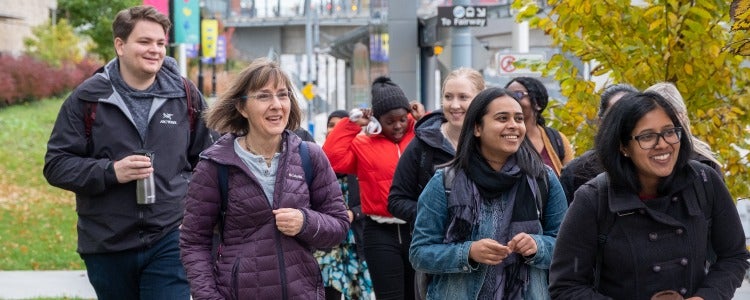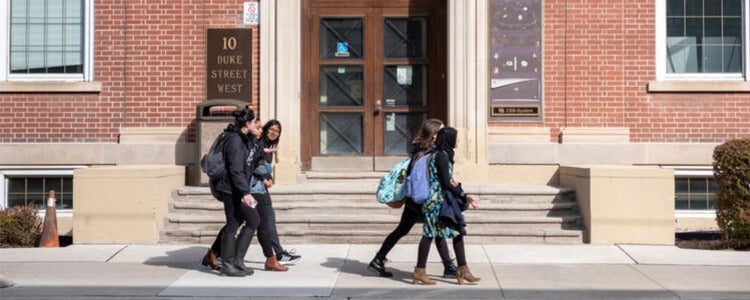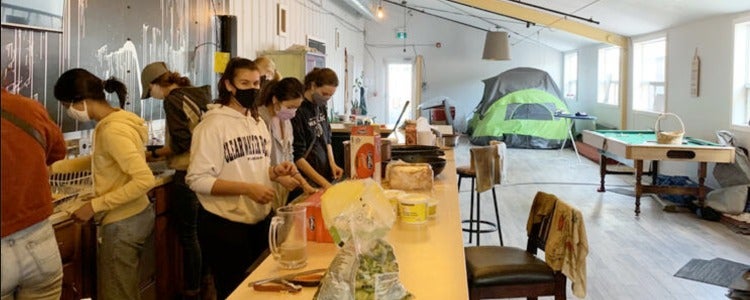
The human faces of the social determinants of health.
Have you ever visited a safe injection site? Prepared meals for people experiencing homelessness? In the Health 448 course, those might be your usual field trips.
A final year in the field
HLTH 448, Advanced Studies in Social Determinants of Health, is all about experiential learning.
It’s a capstone course, where students in their fourth year of Public Health or Health Sciences can apply the knowledge and skills they’ve been building throughout the degree.
“This course involves a lot of fieldwork. A lot of fieldwork,” says the program’s instructor, Professor Kelly Anthony. One year, for instance, Anthony’s class was organized around the community services offered by The Working Centre in Kitchener. Students spent many hours with employees and clients at The Working Centre’s meal centre, communal café, second-hand shop, and job search resource centre.

Definitions
Public health is about improving society’s policies and practices to improve a population’s health and wellbeing.
Social determinants of health are the societal factors that can impact your health over your lifetime: education levels, working conditions, and access to healthy food, for example.
Opportunity in challenge
COVID-19 changed everything. Public health restrictions in the pandemic made that kind of field work impossible. As she set out to adapt the course for online learning, Anthony says, “I was concerned because this class is something that students really look forward to. It’s a unique experience.”
Then Anthony learned that local developer Ron Doyle offered land to build the innovative Lot42: A Better Tent City — a collection of one-room houses created to accommodate the unhoused during the pandemic. Anthony saw a once-in-a-lifetime opportunity. “I organized my entire class around the study of Lot42 and all its intersections with the social determinants of health.”
Nine of the class’s 23 students have joined Anthony to form one of the seven teams that make dinner once a week for Lot42’s 40 residents. The students who come to Lot42 are strictly volunteers: they don’t get extra credit. But the experience they gain is worth far more than a half-grade bump.

The benefits of being there
“This is the perfect course for me,” says fourth-year student Taryn. “I knew this year, especially with COVID-19, that I needed something that would make a difference.”
Student volunteers build connections with residents. They talk with the workers from local harm-reduction organizations who visit Lot42 every day. And they learn how to avoid the traps of “poverty tourism”: they let residents initiate conversations, for example, and don’t go where they haven’t been invited.
The hands-on experience they bring back to class breathes life into learning, even for the students who aren’t able to volunteer. “Each week the whole class discusses the concepts that intersect with Lot42,” says Anthony. “Those of us who are on site are able to tell them through our eyes, and a critical lens.” “Our discussion board online is super-duper active,” notes Taryn. “We have a lot of great discussions.”
This is the perfect course for me. I knew this year, especially with COVID-19, that I needed something that would make a difference.
“Being invited to work there has been really amazing and meaningful,” she adds. “We have the tendency to talk about addiction and poverty as if they’re monolithic. But at Lot42 we’re seeing them play out in reality and how they impact different people at different stages of life.” Now Taryn is passionate about working with grassroots, community-based public health organizations — and she already has some contacts, thanks to HLTH 448.
Anthony’s felt that energy before. “When my students say, ‘I’m doing public health nursing,’ ‘I’m going to law school to help thousands through policy’ — or medical students who go on to be community doctors — I'm proud to know that what they've learned will create ripples and waves of impact far beyond what I could do on my own.
“I see myself as a facilitator and a catalyst for my students, who have such potential to change systems of inequity. And I’m very privileged to do that.”




